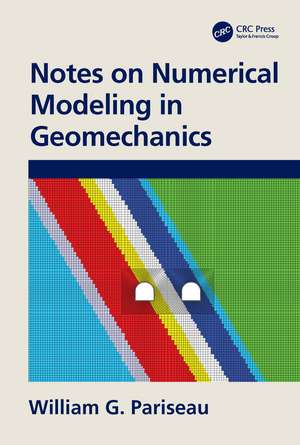Notes on Numerical Modeling in Geomechanics
Autor William G. Pariseauen Limba Engleză Paperback – 31 mar 2022
This work begins with an intuitive approach to interpolation over a triangular element and thus avoids making the simple complex by not doing energy minimization via a calculus of variations approach so often found in reference books on the finite element method. The presentation then proceeds to a principal of virtual work via the well-known divergence theorem to obtain element equilibrium and then global equilibrium, both expressed as stiffness equations relating force to displacement. Solution methods for the finite element approach including elimination and iteration methods are discussed. Hydro-mechanical coupling is described and extension of the finite element method to accommodate fluid flow in porous geological media is made. Example problems illustrate important concepts throughout the text. Additional problems for a 15-week course of study are presented in an appendix; solutions are given in another appendix.
Preț: 487.88 lei
Preț vechi: 530.30 lei
-8% Nou
Puncte Express: 732
Preț estimativ în valută:
93.37€ • 97.35$ • 77.60£
93.37€ • 97.35$ • 77.60£
Carte disponibilă
Livrare economică 27 februarie-13 martie
Livrare express 13-19 februarie pentru 31.97 lei
Preluare comenzi: 021 569.72.76
Specificații
ISBN-13: 9780367762872
ISBN-10: 0367762870
Pagini: 292
Ilustrații: 1 Tables, black and white; 204 Line drawings, black and white; 204 Illustrations, black and white
Dimensiuni: 174 x 246 x 25 mm
Greutate: 0.49 kg
Ediția:1
Editura: CRC Press
Colecția CRC Press
ISBN-10: 0367762870
Pagini: 292
Ilustrații: 1 Tables, black and white; 204 Line drawings, black and white; 204 Illustrations, black and white
Dimensiuni: 174 x 246 x 25 mm
Greutate: 0.49 kg
Ediția:1
Editura: CRC Press
Colecția CRC Press
Public țintă
Postgraduate, Professional, Undergraduate Advanced, and Undergraduate CoreNotă biografică
William Pariseau obtained his B.S. degree in Mining Engineering at the University of Washington (Seattle) following the geological option and subsequently earned a Ph.D. in Mining Engineering at the University of Minnesota with emphasis on rock mechanics and with a minor in applied mathematics. Prior to his Ph.D., he obtained practical experience working for the City of Anchorage, the Alaska Department of Highways, the Mineral Resources Division of the U.S. Bureau of Mines (Spokane), the Anaconda Copper Co. in Butte, Montana, the New York-Alaska Gold Dredging Corp. in Nyac, Alaska. He served in the United States Marine Corps (1953-1956). He maintained a strong association with the former U.S. Bureau of Mines, first with the Pittsburgh Mining Research Center and later with the Spokane Mining Research Center. He is a registered professional engineer and has consulted for a number of commercial and government entities.Currently, he is a professor emeritus and former holder of the Malcolm McKinnon endowed chair in mining engineering at the University of Utah. He joined the Department in 1971 following academic appointments at the Montana College of Science and Technology and the Pennsylvania State University. He has been a visiting academic at Brown University, Imperial College, London, and at the Commonwealth Science and Industrial Research Organization (CSIRO), Australia. He and colleagues have received a number of rock mechanics awards; he was recognized as a distinguished university research professor at the University of Utah in 1991. In 2010, he was recognized for teaching in the College of Mines and Earth Sciences with the Outstanding Faculty Teaching Award. The same year, he was honored by the Old Timers Club with their prestigious Educator Award. He was honored as a Fellow of the American Rock Mechanics Association in 2015.
Cuprins
1. Introduction. 2. Interpolation Over a Triangle. 3. Derivatives of Interpolation Functions. 4. Linear Interpolation Over a Quadrilateral. 5. Derivatives for a Linear Displacement Quadrilateral. 6. Element Equilibrium and Stiffness. 7. Global Equilibrium and Global Stiffness. 8. Static Condensation and a 4CST Element. 9. Equation Solving. 10. Material Nonlinearity. 11. Time Integration. 12. Finite Element Seepage Formulation. 13. Hydro-mechanical Coupling. 14. Boundary Element Formulations. 15. Distinct Element Formulations. 16. Conclusion. Appendix A: Review of Fundamental Concepts. Appendix B: Study Questions. Appendix C: Question Replies.
Descriere
This book is an introduction to numerical analysis in geomechanics and is intended for advanced undergraduate and beginning graduate study of the mechanics of porous, jointed rocks and soils.
